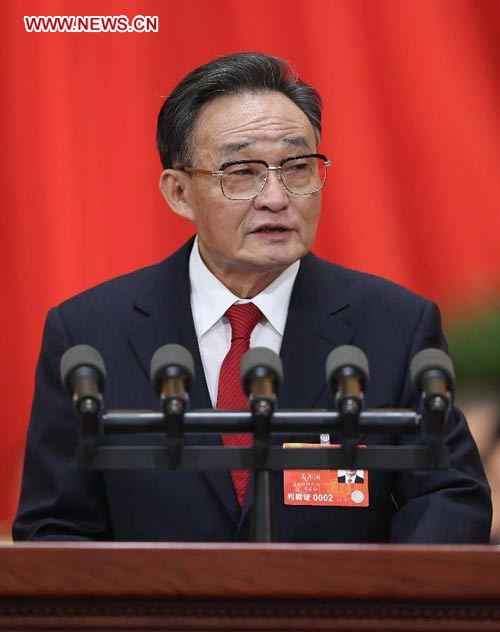

 Latest News|Photo & Video|NPC News|CPPCC News|Commentaries|China Politics
Latest News|Photo & Video|NPC News|CPPCC News|Commentaries|China Politics |
| Wu Bangguo delivers a work report of the Standing Committee of the National People's Congress (NPC) during the second plenary meeting of the first session of the 12th NPC at the Great Hall of the People in Beijing, capital of China, March 8, 2013. (Xinhua/Pang Xinglei) |
BEIJING, March 8 (Xinhua) -- China's top legislator Wu Bangguo highlighted progress in legislation and the system of the people's congresses over the past five years Friday at the annual national legislative session.
Wu delivered the work report of the 11th National People's Congress (NPC) Standing Committee for the last time as the NPC Standing Committee chairman.
Over the past five years, the NPC and its Standing Committee deliberated 93 bills, legal interpretations and draft decisions on legal issues and passed 86 of them, Wu said.
In 2010, a socialist system of laws with Chinese characteristics was established on schedule, he said.
The system is based on the national conditions and realities in China, meets the needs of reform, opening up and socialist modernization; fully reflects the will of the Party and the people and is rooted in the Constitution, Wu said.
It is "a major milestone" of China's socialist democracy and socialist legal system, and "an important indicator" of the maturity of the socialist system with Chinese characteristics, and it has great practical importance and far-reaching historical significance, he said.
Besides legislation, the NPC and its Standing Committee, as the country's highest organ of state power, have exercised the duty of supervision on the government and judicial system and decided on major state affairs.
The system of people's congresses is the fundamental political system that reflects the nature of China as a socialist state and ensures that the people determine their own destiny, Wu said.
"We fully understood the essential difference between China's system of people's congresses and Western capitalist countries' systems of state power," he said.
The top legislature has resisted the influence of all kinds of "erroneous thought and theories," and maintained a firm and clear position on major issues of principle, he said when reviewing the work over the past five years.
"We drew on the political achievements of other societies, but never copied the model of Western political systems," he said.